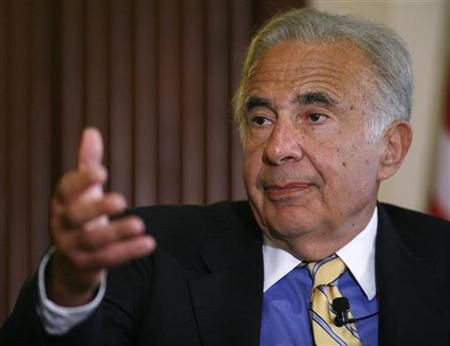Why Would Carl Icahn Want to Buy Stake in Blackberry-Maker RIMM?
ANALYSIS

Shares of beleaguered Blackberry-maker Research-In-Motion Ltd. (Nasdaq: RIMM ) jumped as much as 7 percent on Tuesday merely on the unconfirmed rumors that corporate raider Carl Icahn was seeking to purchase a stake in the company.
RIMM shares gave back these gains a bit later in the session, but still finished the day up about 4.5 percent.
For a stock that has plunged more than 60 percent, that was quite an extraordinary one-day performance in the absence of any concrete news.
However, the reaction to the Icahn rumor may reflect the immense amount of investor frustration over a company that has rapidly lost its way and seems to have no discernible future in the brutally-competitive sphere of telecommunication devices.
Investors are also irate over a series of profit warnings and a confusing strategic direction for the future.
Indeed, in the SmartPhone market, RIMM has ceded market domination to Apple’s iPhone and to companies that use Google’s Android system.
According to Gartner Inc., RIMM’s share of the global SmartPhone market dropped to 12 percent last quarter from 19 percent a year ago.
RIMM’s Playbook tablet computer has also failed to compete with Apple’s enormously popular iPad product.
David B. Smith, chief investment officer of Rockland Trust Investment Management Group, in Rockland, Mass., said that if the rumors are true, RIMM would present a whole new challenge for Icahn.
“Carl Icahn has a long history of buying up stakes in companies and taking control of the boards,” Smith told International Business.
“He would either pressure management to make changes or put in his own slate of directors. He’s had more successes than failures, so perhaps RIMM stockholders are viewing him in a favorable light. However, Icahn has typically moved in on companies which solid products, but with operational problems. With RIMM, you’ve got a company with severe innovation issues and a product base that is evaporating. I’m not sure what Icahn could do with this kind of situation.”
Moreover, a hostile takeover -- Icahn’s raison d’etre -- might be difficult at RIMM given that the two chief executives (Jim Balsillie and Mike Lazaridis) own a significant chunk of the company’s stock and are the biggest stockholders.
Sameet Kanade, an analyst at Northern Securities Inc. in Toronto, told reporters: “This is a typical Carl Icahn scenario to come in and change. If he did this though, it would have to be on a hostile basis, given that the two co-CEOs own 11 percent of the stock.”
However, it would not be impossible if Icahn could rally enough support from the other major shareholders.
Reportedly, one of the minor investors, Jaguar Financial, has been in consultations with other major shareholders about giving the board of directors the power to look at other strategic options, including spinning off attractive assets (like the company’s patent portfolio) or selling the entire company outright.
Indeed, RIMM shares are very, very cheap – trading at a forward P/E of only 4.6.
Mike Abramsky, an analyst at RBC Capital Markets in Toronto, stated last week that RIMM could make a potential buyout target, citing the company still boasts proprietary messaging services, a global subscriber base and solid patent portfolio.
“Carl Icahn’s stake is unconfirmed,” Abramksy wrote in a note to clients on Tuesday.
“If he has taken a position, he may likely push for a board seat, and compel the company to pursue value-creating strategies such as the sale of the company, ‘Split the Berry’ break-up and others.”
If Icahn actually takes a position in RIMM what might he do?
Icahn’s track record at another major struggling tech company might be illuminating.
A few years ago, he bought a 5 percent stake in Yahoo Inc. (Nasdaq: YHOO), just after the company’s chief executive Jerry Yang rejected a $48-billion buyout offer from Microsoft (Nasdaq: MSFT).
Icahn tried to re-start talks with Microsoft (which failed), but he managed to get three of his people onto Yahoo’s board – which ultimately led to the forcing out of Yang and the placement of Carol Bartz as company head.
Just after Bartz became boss, she signed a 10-year agreement with Microsoft to outsource its search engine.
However, now Bartz herself has been pushed out (i.e, fired) and Yahoo is still is a precarious position, likely seeking a buyer itself.
Icahn’s imprint on Yahoo would be described as mixed, at best.
© Copyright IBTimes 2025. All rights reserved.





















